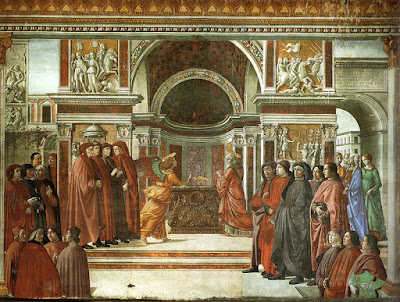The Catholic Church, East and West, celebrates three birthdays on the liturgical calendar: The Nativity of Jesus (December 25); the Nativity of Mary, Mother of God (September 8); and the Nativity of St. John the Baptist (June 24). We also celebrate the Conception of Jesus (the Annunciation on March 25) and the Immaculate Conception of the Blessed Virgin Mary (December 8), each exactly nine months before their birthdays. We in Roman Rite do not, however, celebrate the Conception of St. John the Baptist nine months before the feast of his Nativity--but the Orthodox Church does, on September 23. As far as I can tell, the Byzantine Catholic Church (Eastern Rite Catholic) does not celebrate the Forerunner's Conception either. UPDATE: Evidently, they do, although when I searched I could not find a calendar. See the Facebook page for Saint Irene's Byzantine Catholic Church's celebration of the feast.
The story of his miraculous conception of aged parents is told in the Gospel according to St. Luke (1:5-25). According to the Orthodox Church in America (OCA) website, they also honor the Forerunner's parents as the Holy Prophet Zachariah and the Righteous Elizabeth on September 5. Zachariah is sometimes identified as the son of Barachias, who was slain "between the temple and the altar" (Matthew 23:35) mentioned when Jesus is accusing the Scribes and Pharisees of ignoring the prophets. According to the OCA website:
When King Herod heard from the Magi about the birth of the Messiah, he decided to kill all the infants up to two years old at Bethlehem and the surrounding area, hoping that the new-born Messiah would be among them.
Herod knew about John’s unusual birth and he wanted to kill him, fearing that he was the foretold King of the Jews. But Elizabeth hid herself and the infant in the hills. The murderers searched everywhere for John. Elizabeth, when she saw her pursuers, began to implore God for their safety, and immediately the hill opened up and concealed her and the infant from their pursuers.
In these tragic days Saint Zachariah was taking his turn at the services in the Temple. Soldiers sent by Herod tried in vain to learn from him the whereabouts of his son. Then, by command of Herod, they murdered this holy prophet, having stabbed him between the temple and the altar (MT 23: 35). Elizabeth died forty days after her husband, and Saint John, preserved by the Lord, dwelt in the wilderness until the day of his appearance to the nation of Israel.
Some sources online (including the Catholic News Agency) have indicated that the Roman Martyrology lists Saints Zachariah and Elizabeth on the calendar on November 5th but I do not find that feast/memorial on the USCCB Liturgical Calendar for 2020 (it's a feria). It seems strange that we do not honor them on the sanctoral calendar, especially since Elizabeth's greeting to Mary at the Visitation is such a great event in the Nativity stories--and the moment of St. John's being filled with the Holy Spirit in his mother's womb when Elizabeth heard Mary's greeting (Luke 1:42-45)--and such a part of Catholic devotion (the second Joyful Mystery of the Rosary). And Zechariah's Benedictus has long been part of the Liturgy of the Hours, as Mary's Magnificat, in response to Elizabeth's praise, has also been.
Saint John the Baptist, pray for us!
Saint Zechariah, pray for us!
Saint Elizabeth, pray for us!
Image Credit (Public Domain): Annunciation of the Angel to Zechariah by Domenico Ghirlandaio (1490, fresco in the Tornabuoni Chapel, Florence)

No comments:
Post a Comment